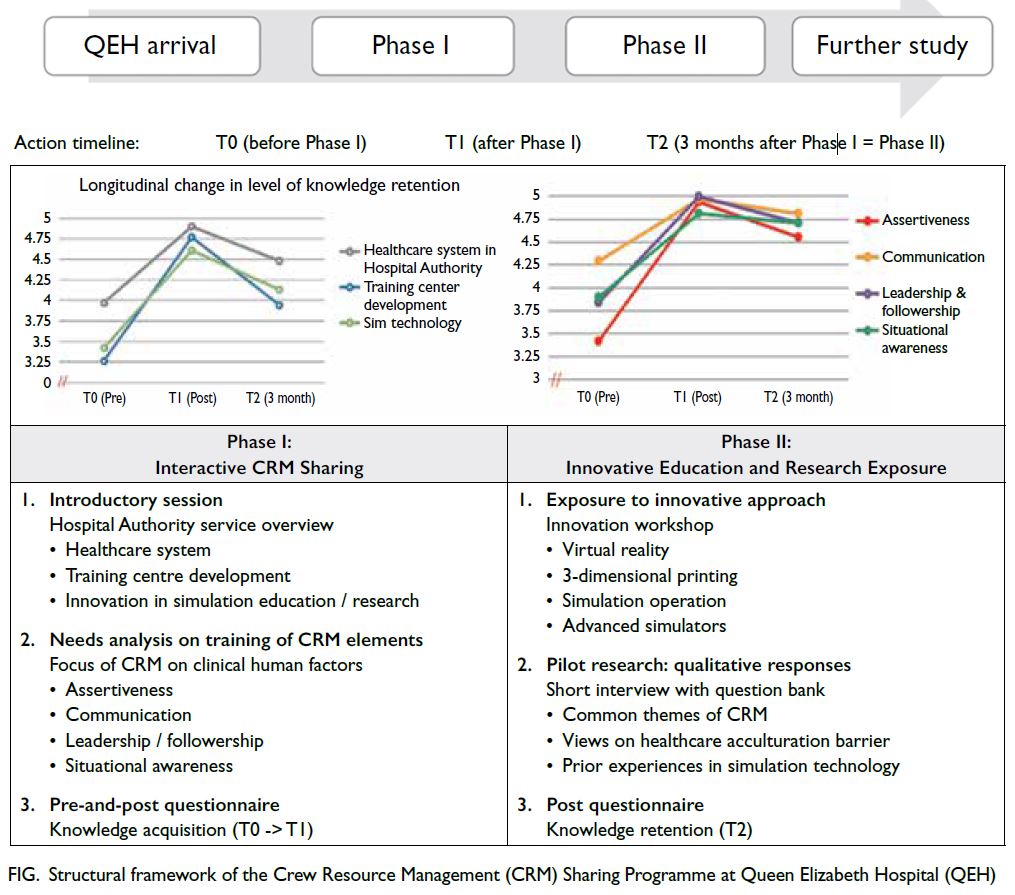Hong Kong Med J 2025;31:Epub 11 Jul 2025
© Hong Kong Academy of Medicine. CC BY-NC-ND 4.0
LETTER TO THE EDITOR
Strengthening service integration of non–locally
trained healthcare professionals through crew resource management: longitudinal measures and beyond
Eric HK So, MB, BS, FHKAM (Anaesthesiology)1,2; Victor KL Cheung, MSc(OP), RegPsychol(HKPS)1; LH Chan, MB, BS, FHKAM (Anaesthesiology)1; Jeff WH Yip, BSSc1; PK Wong, RN1; Spring HK Cheung, MSc, BSc1; NH Chia, MB, BS, FRCSEd (Gen)1,3; George WY Ng, MB, BS, FCICM1,4
1 Multi-Disciplinary Simulation and Skills Centre, Queen Elizabeth Hospital, Hong Kong SAR, China
2 Department of Anaesthesiology, Perioperative and Pain Medicine, Queen Elizabeth Hospital, Hong Kong SAR, China
3 Department of Surgery, Queen Elizabeth Hospital, Hong Kong SAR, China
4 Intensive Care Unit, Queen Elizabeth Hospital, Hong Kong SAR, China
Corresponding author: Dr Eric HK So (sohke@ha.org.hk)
To the Editor—The Hospital Authority launched
the Greater Bay Area Healthcare Talents
Exchange Programmes in September 2022 for
capacity enhancement.1 Following the Sharing
Activity for Non–Locally Trained Healthcare
Professionals, also known as 深化醫療團隊協作計劃
(Phase I),1 this project (Phase II) included brief
open-ended questions to elicit qualitative responses
on common themes of healthcare acculturation
barriers, and distributed a questionnaire to quantify
preferences for crew resource management (CRM)
elements,2 experiences with integrating innovative
approaches to healthcare education, and perceived
levels of knowledge acquisition at three time points.3 4
Our multidisciplinary team comprised medical
and surgical consultants, a nurse, administrators,
and a research psychologist. All non–locally trained
doctors and nurses who had completed Phase I (for
introduction and interactive CRM sharing purposes)
were invited to participate in Phase II (for innovative
education and research exposure purposes) 3 months
later (acceptance rate=91%) [Fig].3 The study was
approved by the Hospital Authority Research Ethics
Committee, Kowloon Central/Kowloon East, Hong Kong (IRB
Ref No.: KC/KE-23-0174/FR-3). Written informed
consent was obtained from all participants included
in the study.

Figure. Structural framework of the Crew Resource Management (CRM) Sharing Programme at Queen Elizabeth Hospital (QEH)
After a full review, the research team identified
common themes related to CRM, service gaps in
innovative medical education, and barriers to the
healthcare acculturation process. Matched scale data
from Phase I were retrieved, and the same items on
contextual knowledge acquisition (covering overall
service and CRM elements) were re-evaluated
using a 5-point Likert scale (1=strongly disagree;
5=strongly agree) to assess the learning effect across
three time points.1 4
Participants (n=31) considered healthcare
simulation training effective in enhancing the
quality and safety of healthcare services (mean
score=9.71/10, standard deviation=±0.63). Despite the perceived
enhancement of training quality by innovative
technologies (mean score=9.34/10, standard deviation=±1.00), almost
all participants had prior experience with traditional
training modalities (standardised patient, 97%;
part-task trainer, 94%) but limited exposure
to advanced technology counterparts (virtual/augmented reality, 26%; three-dimensional printed simulators, 29%).
Major challenges encountered in the
acculturation process by participants were themed
around communication barriers (45%) and service
culture (35%).1 5 With a significant main effect of
time [F(2,60)=35.82, P<0.001], post-hoc tests using
Bonferroni correction revealed that contextual
knowledge in service overview and CRM elements
increased by 1.07 unit scores after Phase I (P<0.001),
then dropped by 0.36 unit scores after a 3-month
washout period (P<0.05).
The findings confirmed high acceptance of,
and a perceived need for, innovative simulation
training modalities among non–locally trained
professionals to enhance the quality and safety
of healthcare services. The observed learning
retention curve (peaking at the completion of Phase
I but declining by >30% in 3 months) reminded
simulation educators of the importance of memory
consolidation with post-learning materials and
scenario-based practice in CRM elements. Further
studies should explore specific patterns of cross-cultural
behaviour,2 4 themes of communication
barriers in clinical handover, and coping strategies
in the acculturation process.3 5
Author contributions
All authors contributed to the concept or design of the letter,
acquisition of data, and analysis or interpretation of data.
EHK So and VKL Cheung drafted the letter. All authors
critically revised the letter for important intellectual content.
All authors had full access to the data, contributed to the
study, approved the final version for publication, and take
responsibility for its accuracy and integrity.
Conflicts of interest
All authors have disclosed no conflicts of interest.
Acknowledgement
The authors express their gratitude to the Hospital Authority
Head Office Medical Grade and the hospital management
of the Kowloon Central Cluster for their support and
contribution to the Crew Resource Management programme
specialised for non–locally trained healthcare professionals
from the Greater Bay Area.
Funding/support
This letter received no specific grant from any funding agency
in the public, commercial, or not-for-profit sectors.
References
1. So EH, Cheung VK, Leung AS, et al. Specialised crew resource management programme for non–locally trained healthcare professionals: expediting healthcare cultural
adaptation. Hong Kong Med J 2024;30:80-1. Crossref
2. Chan CK, So EH, Ng GW, Ma TW, Chan KK, Ho LY.
Participant evaluation of simulation training using crew
resource management in a hospital setting in Hong Kong.
Hong Kong Med J 2016;22:131-7. Crossref
3. Cheung V, So EH, Nestel D, et al. Technology-enhanced
training for central venous catheter insertion training:
a reflective essay. Int J Healthc Simul 2024 Apr 19. Epub
ahead of print. Crossref
4. So EH, Cheung VK, Ng CW, et al. Maintaining facilitative
conflict management style and self-efficacy through O&G
specific CRM Classroom Training in Queen Elizabeth
Hospital. Proceedings of the KCC Convention; 2024
October 25; Hong Kong SAR, China.
5. Ng GW, Cheung VK, So SS, et al. Practice of medical
interns on clinical handover with artificial intelligence
[abstract]. Simul Healthc 2024;19:e10.

